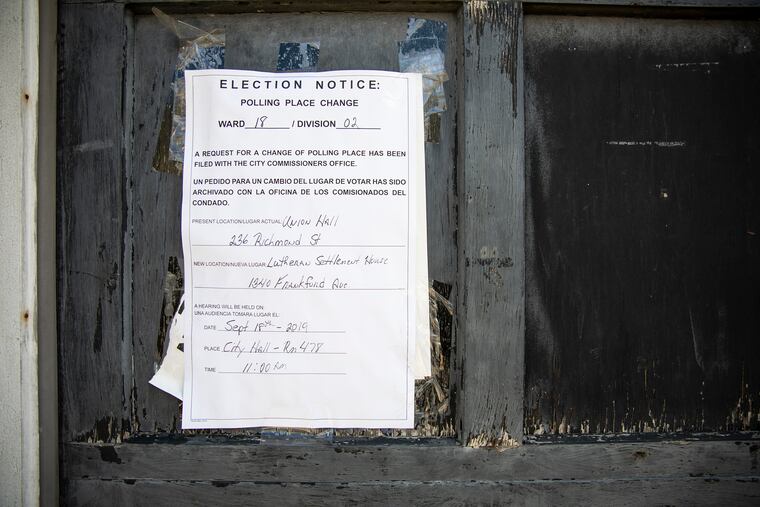Voting rights groups question Philly’s polling place changes
Polling place changes can confuse and ultimately disenfranchise voters, the groups warned.

Philadelphia elections officials have moved 89 polling places for next week’s municipal election — a routine action, but a group of voting rights organizations says it is concerned the changes were made without giving the public enough input and properly publicizing them.
“It is incumbent upon the city to make these changes in the least disruptive manner and take meaningful steps to communicate these changes,” reads a letter the groups sent Wednesday night to the Philadelphia Board of City Commissioners.
The letter was signed by All Voting Is Local, the ACLU of Pennsylvania, Campaign Legal Center, the Lawyers’ Committee for Civil Rights Under Law, the Pennsylvania Immigration and Citizenship Coalition, and Pennsylvania Voice. They were particularly concerned about changes close to the election, which they said “increases the risk of confusion and of voters casting provisional ballots at the wrong polling place, which may result in disenfranchisement.”
Nick Custodio, a deputy city commissioner, responded Thursday morning to what he called the “misinformed” letter.
“You ask us to commit to things that we are already doing and required to do per the Pennsylvania Election Code,” he wrote in response.
Changes to the locations of polling places are normal in advance of every election. Philadelphia has more than 1.06 million registered voters in more than 1,700 ward divisions, and this year the commissioners made changes to voting sites in 89 of the divisions.
Why polling places change
The city commissioners move the locations of polling places for a variety of reasons, including population changes, the willingness of building owners to allow voters access from 7 a.m. to 8 p.m. on election days, and the availability of new locations. This year, that included several sites that were moved to accommodate new voting machines, increasing accessibility for voters with physical disabilities and mobility issues.
Of the changes, 84 were made by the Oct. 16 deadline.
An additional five emergency changes were made to polling places, including one because a building owner died. Those five were approved by a judge and finalized Oct. 23.
Before making changes, city officials post signs at the current polling place, the proposed new location, and around the precinct. They also send letters to political party ward leaders and the precinct’s election workers and hear from the public at weekly meetings.
How voters are notified of changes
Voters whose precinct changes or whose polling place moves are mailed a new voter registration card with the new address on it. Signs are posted at the previous and new locations, as well as around the precinct.
Additionally, Custodio said in his reply letter, commissioners will run polling place lists in The Inquirer, the Daily News, and the Legal Intelligencer on Monday and in weekly papers this week.
The list is also available on the commissioners’ website and voters can search for their address to find their polling place.
The impact of polling place changes
Miguel L’Heureux, national campaign manager for All Voting Is Local, said the city “is not doing enough to reach out to impacted voters,” expressing concerns polling-place changes could confuse voters and depress turnout.
“Polling place closures and changes of all kinds cause disruptions, long lines, transportation hurdles,” and other problems, L’Heureux said. “In an election where you have one opportunity to vote and you’ve already made your plan to get to the polling location, you may not have time [to go to a new location] because you have to go to work or pick up your child from school, so you may be out of luck, through no fault of your own.”
Older voters, voters with disabilities, low-income voters, and voters of color would be particularly likely to be affected, L’Heureux said, because they are less likely to be able to easily get to a new location to cast their vote.
All Voting Is Local will run social media ads starting Friday to help voters find their polling place and notify them it may have changed.